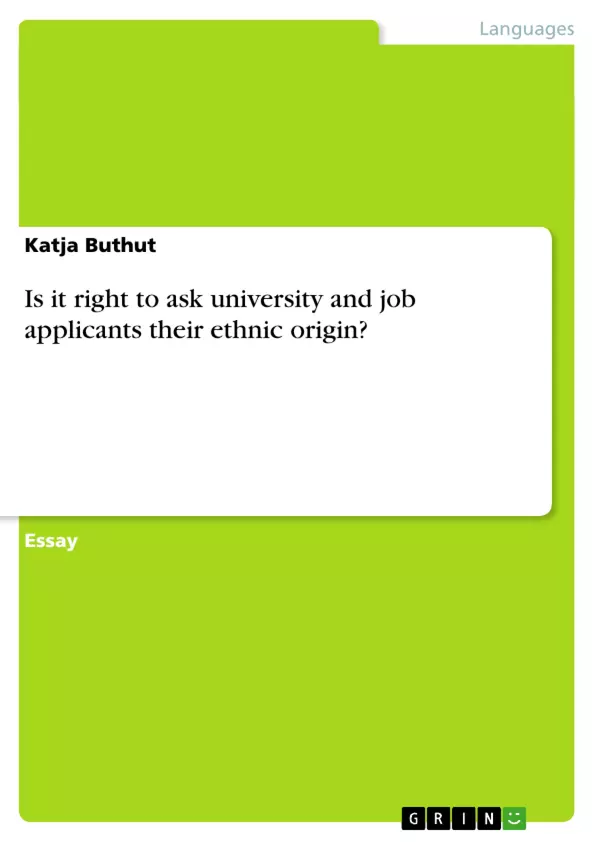The second day in the university, I wanted to register with the medical centre. I had to fill in a form asking me about my address, previous diseases and allergies. At the bottom of the page there was a field where I had to tick a box confirming which ethnic background I had. I considered the filling in of that form to be up to my own knowledge and conscience and as I had never been asked such a question before I left the box blank and handed the form to the lady seated at the desk. She scanned through what I had filled in and gave it back to me: “You must fill in your ethnic origin,” she said. I told her I did not know what my ethnic origin was and that I had never been asked that before – not mentioning that I was utterly confused by the many choices I had. Of course, I knew I was white. But I was not ‘White English’ or ‘White Scottish’ or ‘White Welsh’, which was certain. She said: “You are from Germany? So you are ‘White Other’.” Now, that really killed me. I ticket the corresponding box and discomposedly went outside, wondering what difference it would make to define my ethnic background this specifically. And, if she knew I was from Germany and thus my ethnic origin was ‘White Other’, why did I have to tick the box then? Can’t she guess it herself? What was the use of that anyway?
Inhaltsverzeichnis (Table of Contents)
- Is it right to ask university and job applicants their ethnic origin?
- The United Nations' Charta
- The Buckinghamshire County Council
- The Russian Experience
- The German Experience
Zielsetzung und Themenschwerpunkte (Objectives and Key Themes)
This text examines the issue of asking individuals their ethnic origin, particularly in the context of university and job applications. It explores the justification for such inquiries, particularly in relation to medical needs and ethnic monitoring. The text further analyzes the broader implications of ethnic monitoring, examining international perspectives, legal frameworks, and social implications.
- The ethical and practical considerations of asking individuals their ethnic origin.
- The role of ethnic monitoring in addressing healthcare disparities and promoting social inclusion.
- The historical and cultural contexts of ethnic discrimination and the challenges of achieving equality.
- International perspectives on ethnic monitoring and the implementation of relevant policies.
- The impact of ethnic monitoring on individual privacy and potential for discrimination.
Zusammenfassung der Kapitel (Chapter Summaries)
- The text begins by recounting the author's personal experience with being asked about their ethnic origin at a university medical center. This personal anecdote serves as a springboard for exploring the justification behind such inquiries, particularly in the context of healthcare.
- The text then delves into the medical rationale for ethnic monitoring, highlighting the prevalence of certain diseases among specific ethnic groups and the potential benefits of this information for medical practitioners.
- The text further explores the broader social implications of ethnic monitoring, discussing the United Nations' Charta and its recommendations for protecting and integrating ethnic minorities into society.
- The author then contrasts their experience in the UK with those in Russia and Germany, highlighting differing attitudes and approaches to ethnic monitoring in these countries.
- The text concludes by acknowledging the potential benefits of ethnic monitoring while also questioning the underlying societal assumptions that necessitate such inquiries. It suggests that asking individuals their ethnic origin may reflect a lack of acceptance and understanding of diversity.
Schlüsselwörter (Keywords)
This text focuses on the key concepts of ethnic origin, ethnic monitoring, social inclusion, healthcare disparities, discrimination, and cultural diversity. It examines the intersection of these topics in the context of modern British society and explores the complexities of balancing individual privacy with societal needs.
Frequently Asked Questions
Why are applicants asked about their ethnic origin in the UK?
It is often used for ethnic monitoring to address healthcare disparities, promote social inclusion, and ensure equal opportunities.
Is there a medical reason for ethnic monitoring?
Yes, certain ethnic groups may have a higher prevalence of specific diseases or allergies, which can be vital information for medical practitioners.
How do Germany and Russia handle ethnic monitoring compared to the UK?
The text highlights that attitudes differ significantly; for example, in Germany, such questions are much less common due to historical and cultural contexts.
What are the concerns regarding individual privacy?
Asking for ethnic origin can be seen as an intrusion of privacy and carries the potential for discrimination if the data is misused.
What does the UN Charter say about ethnic minorities?
The Charter includes recommendations for protecting and integrating ethnic minorities to ensure they are full members of society.
- Citar trabajo
- Katja Buthut (Autor), 2006, Is it right to ask university and job applicants their ethnic origin?, Múnich, GRIN Verlag, https://www.grin.com/document/134717



